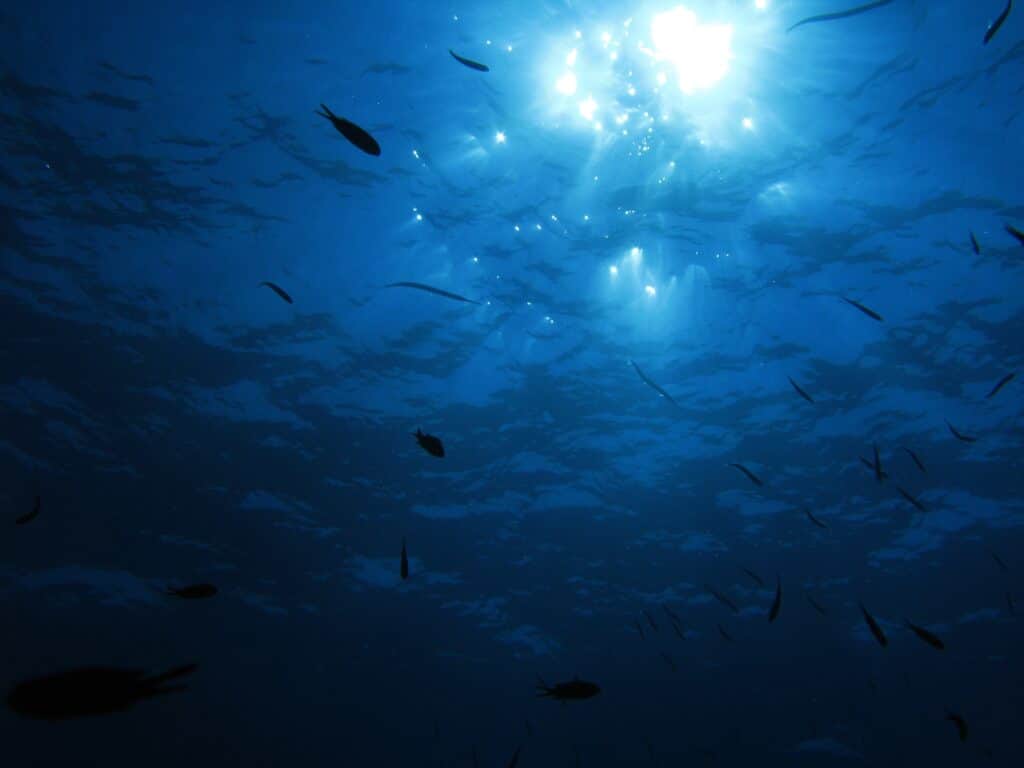For marine scientists who can tolerate long periods of darkness and cold temperatures, the winter in the Arctic provides an intriguing laboratory. Until recently, scientists believed that the marine ecosystem in the Arctic shut down for the winter months due to the absence of sunlight and food. However, research has in fact shown that some zooplankton thrive in darkness and play an important role in fueling the Arctic’s rebirth each spring. As the Arctic undergoes rapid changes, such as warming temperatures and thinning sea ice, researchers are motivated to understand how increasing levels of artificial light, a consequence of human activity, could alter this delicate ecosystem.

Discovering Life in the Polar Night
The push to study organisms living in the dark Arctic waters in winter began when Jørgen Berge, a marine ecologist at UiT The Arctic University of Norway in Tromsø, observed a surprising pattern in the waters over the winter months. Biomass in the fjord’s waters exhibited what is known as diel vertical migration, meaning movement to deeper water during the day and ascending towards the surface at night. This contradicted the belief that marine life remained dormant during the polar night. Berge’s subsequent expeditions confirmed the continued activity of marine organisms during this period. He also leads Deep Impact, a research project funded by the Norwegian Research Council.
Increased Light Pollution in a Changing Environment
The Arctic has warmed much faster than the rest of the planet over the past 40 years, contributing to thinner winter ice and reduced ice in spring and summer. This has allowed increased human activity, including shipping, tourism, and coastal development, contributing to increasing levels of artificial light in the region. The researchers emphasize the need to understand the effects of less darkness on the region’s ecosystem. “Organisms seek darkness,” said Berge, “that is why artificial light has such an impact.”
Innovative Solutions
The research team discovered that even a weak beam from a headlamp caused biomass to disperse, highlighting the sensitivity of marine organisms to light and the potential disruption caused by their own research activities. They therefore use innovative research study methods while monitoring the impact of artificial light on marine life. The researchers deploy cutting-edge optical and acoustic instruments, carried by nets, circular steel frames known as rosettes, and underwater autonomous vehicles. Using an ultra-sensitive light meter developed with support from NASA, for example, the researchers studied changes in natural light occurring between day and night at depths of more than 40 meters. They also recorded the reactions of marine life to a lights-off, lights-on protocol, to observe the behavioral responses of organisms in the presence or absence of artificial light.
Applying Real-Time Data to Conservation Efforts
The research team continually refines their methods and experiments to gain a deeper understanding of the complex interactions between marine life and artificial light. The Deep Impact project will help determine how species such as krill, copepods, and fish respond to different light conditions and wavelengths. Real-time data collected by the researchers can inform conservation efforts, predict and mitigate the impacts of artificial light, and provide valuable insights into the dynamics of polar night biology.
“As the Arctic opens up, so will human impacts and artificial-light influence,” said Jackie Grebmeier, a marine biologist at the University of Maryland Chesapeake Biological Laboratory in Solomons. “The only way we’re going to have some protection and forecast impacts is to have these real-time data that Jørgen and his team are collecting.”
Did you enjoy this blog post? Check out our other blog posts as well as related topics on our Webinar page.
QPS is a GLP- and GCP-compliant contract research organization (CRO) delivering the highest grade of discovery, preclinical and clinical drug research development services. Since 1995, it has grown from a tiny bioanalysis shop to a full-service CRO with 1,100+ employees in the U.S., Europe and Asia. Today, QPS offers expanded pharmaceutical contract R&D services with special expertise in neuropharmacology, DMPK, toxicology, bioanalysis, translational medicine and clinical development. An award-winning leader focused on bioanalytics and clinical trials, QPS is known for proven quality standards, technical expertise, a flexible approach to research, client satisfaction and turnkey laboratories and facilities. Through continual enhancements in capacities and resources, QPS stands tall in its commitment to delivering superior quality, skilled performance and trusted service to its valued customers. For more information, visit www.qps.com or email info@qps.com.




